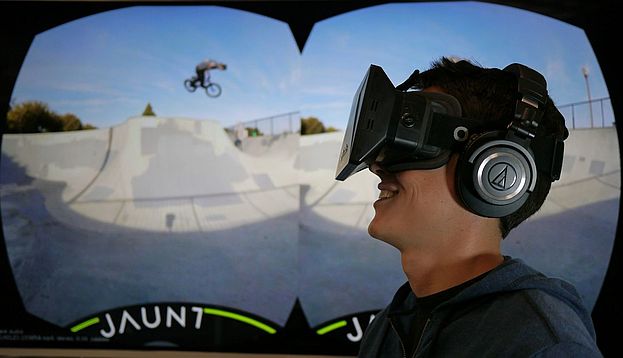Virtual reality is prepared to have its biggest year yet, with the likes of Samsung, Sony, Google and Oculus VR set to debut their hardware at some given point this year. But are Hollywood studios prepared to keep up with the technology
Oculus co-founder Palmer Luckey already stated that content is just as vital to the experience as the headsets themselves. “Without content, nobody would be interested in this whole virtual reality thing.” So, obviously, having the right partners in tow would be a crucial move.
Video games will play a big part in that, but Hollywood studios need to keep up as well, with production studios ready to make the transfer to a whole new world. Variety recently reported on studios truly to make this jump, although some aren’t quite sure where it will exactly go.
“There are no real marching orders, because there’s no defined place where things will end up,” said Ted Schilowitz, leader of the Fox Innovation Lab for 20th Century Fox studios. “You have to be very nimble at this point.”
Consumers could play a big part in the virtual reality demand, especially with the introduction of new headsets on the market. But now it’s a matter of how effectively content is used to transport them into another world, based mainly on Hollywood franchises and/or original ideas.
Some have already experimented with this in the past, particularly at last year’s San Diego Comic-Con, with Oculus-based demonstrations based on Pacific Rim, Batman, X-Men: Days of Future Past and Into the Storm, amongst other franchises. Studios are also stepping up with original efforts, like the virtual reality-based movie Zero Point, being produced by Condition One.
“There is a lot of energy in Hollywood around immersive video as a new content type that they’re interested in exploring,” said Nick DiCarlo, vice president/general manager of immersive products and virtual reality for Samsung. “That all looks like real investment and the risk-tasking necessary to get something like this off the ground, so I’m very encouraged.”
However, some studios have taken a cautious stance due to trends dropping off, including the fading-out of the 3D television fad, but virtual reality has a much different approach. “We’ve learned you have to create the content for the experience: just converting what you’ve got doesn’t work. You don’t get the immersion you’re looking for,” said Warren Mayoss, head of technology product development for DreamWorks Animation.
Cory Strass-burger, producer for VR who previously worked with NBC Universal and Lionsgate, added, “The market is nonexistent really, so you have a lot of creative people wanting to make stuff for installation-based things.”
With the introduction of the devices, however, things could certainly take a turn – it just depends what market shows the most interest. “If VR is only ever for gaming, it is a good business,” added DiCarlo. “Expand it past gaming, it will be a great business.”
More details on the push for virtual reality content can be found here.

